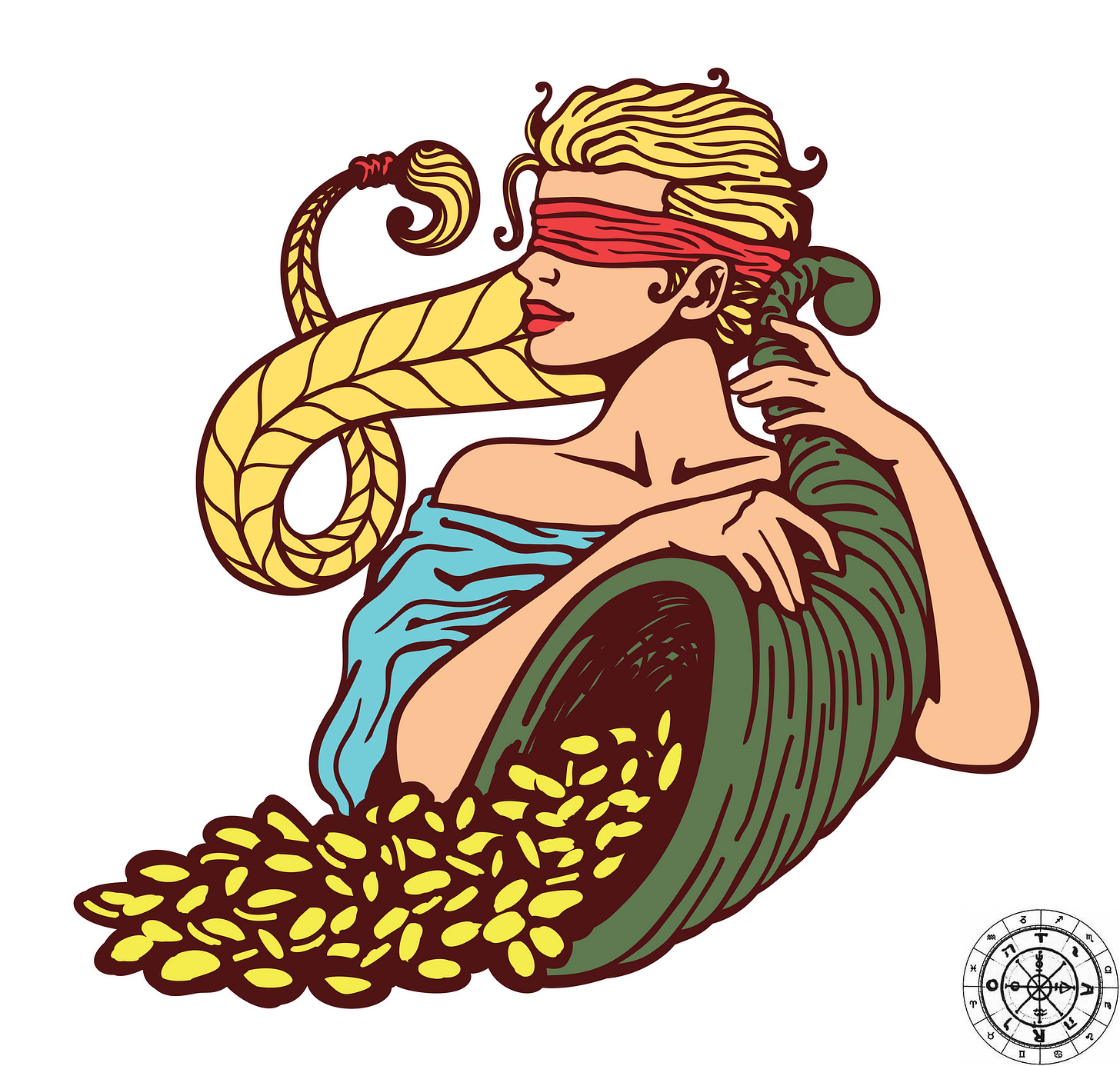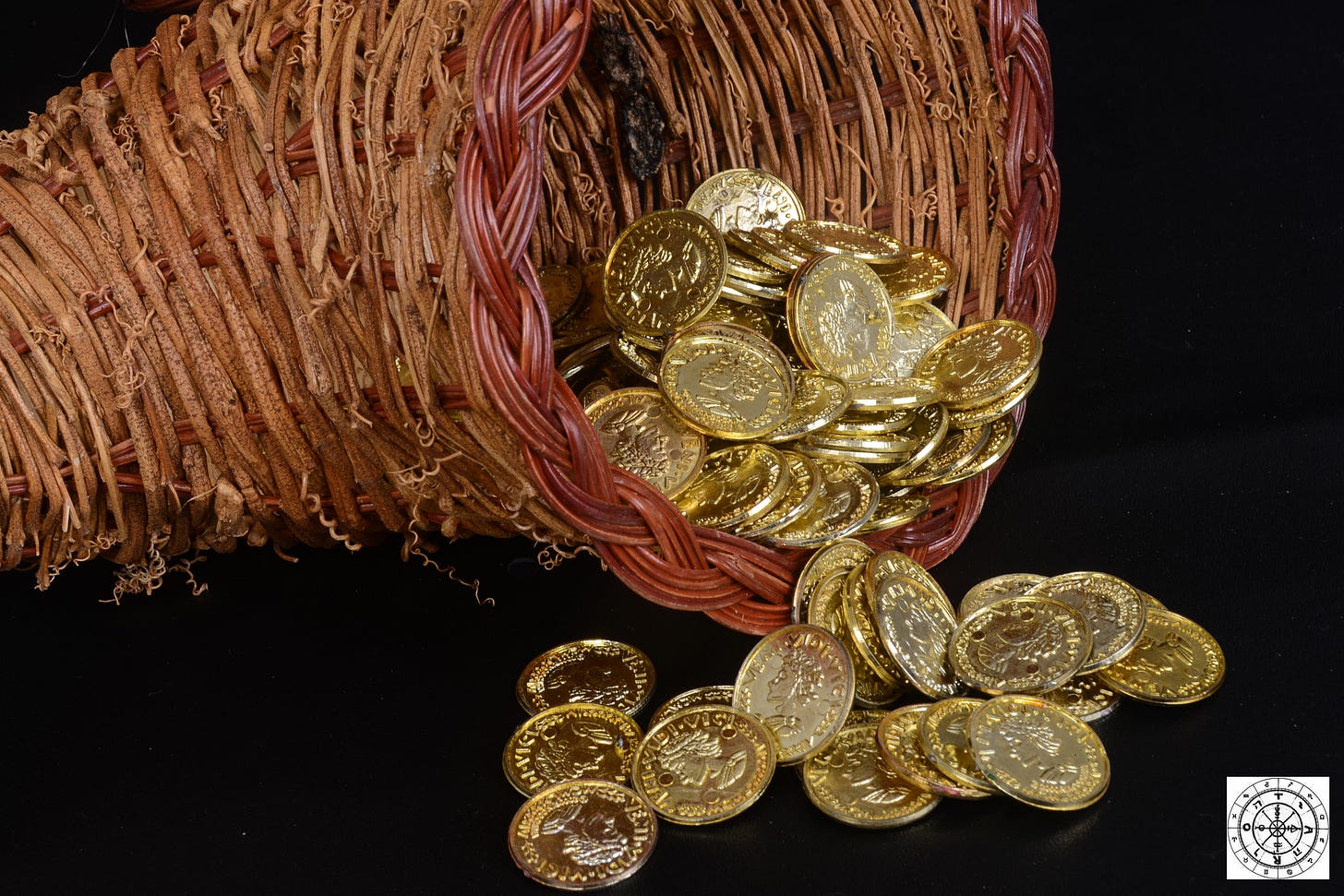Embracing the Whims of Fate: Honoring the Goddess Fortuna
Origins, Significance and Paying Homage Today
From the swirling mists of ancient Roman mythology emerges Fortuna, the enigmatic Goddess of Luck and Fortune. Her story, veiled in the mystery and fascination of antiquity, offers us timeless insights into the nature of chance, fate, and prosperity. As we journey through her origins, symbolic significance, and modern-day practices to pay homage to her, we unravel the threads that connect us to this divine figure.
Origins of Fortuna: From Myth to Reality
Fortuna, also known as Lady Luck, is one of the most revered deities in Roman mythology. Her name is derived from the Latin word "fors," meaning "chance" or "luck." She embodies the capricious nature of fortune, holding both the power to bestow great blessings and to wreak havoc with equal ease. Represented often with a wheel, cornucopia, or a blindfold, Fortuna's imagery signifies the unpredictable nature of fate and the cyclical nature of life's ups and downs.
The Wheel of Fortune
One of the most iconic symbols associated with Fortuna is the Wheel of Fortune. This ever-turning wheel symbolizes the constant flux of human fortune – what is high will eventually fall, and what is low will rise again. In medieval and Renaissance art, Fortuna is often depicted spinning this wheel, reminding mortals of the impermanence of their circumstances. The Wheel of Fortune serves as a metaphor for the uncertainty of life and the inevitability of change.
The Cornucopia: Abundance and Prosperity
Fortuna is also frequently depicted holding a cornucopia, or horn of plenty, which symbolizes abundance and prosperity. This imagery underscores her role as the giver of good fortune and material blessings. The cornucopia, overflowing with fruits and grains, represents the bounty that Fortuna can provide when she smiles upon her devotees. It serves as a reminder that, despite life's uncertainties, there are moments of plenty and joy.
The Blindfold: Impartiality and Indifference
Another common symbol associated with Fortuna is the blindfold. This imagery highlights the impartial and indifferent nature of luck and fate. Unlike other deities who might favor specific individuals or groups, Fortuna's influence is arbitrary, affecting all without bias. The blindfolded Fortuna illustrates the idea that fortune is not earned or deserved but given and taken away without rhyme or reason.
Fortuna in Roman Culture and Beyond
In ancient Rome, Fortuna was venerated in various forms, reflecting her multifaceted nature. From Fortuna Redux, the goddess who brought travelers safely home, to Fortuna Muliebris, the protector of married women, her worship encompassed different aspects of life. Temples dedicated to Fortuna dotted the Roman landscape, and festivals in her honor, such as the Fors Fortuna celebrated in June, drew large crowds seeking her favor.
Fortuna Redux: The Guardian of Safe Returns
Fortuna Redux was a specific aspect of the goddess invoked by those embarking on journeys. Travelers and soldiers alike prayed for her protection and guidance, hoping for a safe return. The temple of Fortuna Redux in Rome, built by Augustus to celebrate his victorious return from the East, stood as a testament to her importance in ensuring safe travels and successful ventures.
Fortuna Muliebris: The Protector of Married Women
Fortuna Muliebris, another aspect of the goddess, was revered by married women seeking protection and blessings for their households. Her temple in Rome was a sacred space where women could offer prayers and sacrifices, asking for Fortuna's favor in matters of family, fertility, and domestic harmony. This aspect of Fortuna highlights her role in safeguarding the well-being of women and their families.
Modern-Day Homage to Fortuna: Embracing Her Influence Today
While the ancient temples of Fortuna may no longer stand, her influence endures in modern times. As we navigate the uncertainties of life, invoking Fortuna can help us embrace the ebbs and flows of fate with grace and resilience. Here are some ways to pay homage to Fortuna today:
Creating a Fortuna Altar
An altar dedicated to Fortuna can serve as a focal point for your prayers and meditations. To create a Fortuna altar, choose a space in your home where you can display symbols associated with her, such as a small wheel, a cornucopia, and a blindfold. Adorn the altar with candles, coins, and offerings of fruits and grains. Use this space to reflect on the nature of luck and fortune, and to express gratitude for the blessings in your life.
Practicing Acts of Random Kindness
Embracing Fortuna's impartial nature can inspire us to practice acts of random kindness. By spreading positivity and good fortune to others without expecting anything in return, we align ourselves with the goddess's unpredictable and generous spirit. Whether it's leaving a surprise gift for a neighbor or volunteering your time to help those in need, these acts of kindness can create ripples of positive energy in the world.
Seeking Guidance Through Divination
Fortuna's connection to fate makes her an ideal guide for divination practices. Whether you use tarot cards, runes, or other forms of divination, seek her guidance when faced with uncertainty or difficult decisions. Invite Fortuna to illuminate your path and provide insights into the unseen forces at play in your life. Remember, divination is not about predicting the future, but about gaining clarity and understanding the possibilities ahead.
Celebrating the Fors Fortuna Festival
Reviving ancient festivals can be a meaningful way to honor Fortuna. The Fors Fortuna festival, traditionally celebrated on June 24th, can be observed by organizing a gathering with friends and family. Share a meal, exchange stories of luck and serendipity, and offer thanks to Fortuna for her blessings. Incorporate rituals such as lighting candles, offering coins, and reflecting on the cyclical nature of life.
Going Forward: Embracing the Whims of Fortuna
Fortuna, the Goddess of Luck and Fortune, continues to captivate our imagination with her timeless symbolism and enigmatic presence. From her origins in Roman mythology to her enduring influence in modern times, Fortuna reminds us of the unpredictable nature of life and the importance of embracing both the highs and lows with grace. By paying homage to Fortuna through altars, acts of kindness, divination, and festive celebrations, we honor the ever-turning wheel of fortune and invite her blessings into our lives.
In a world where certainty is often an illusion, Fortuna teaches us to find beauty in the unknown and to cherish the moments of abundance that come our way. As we navigate the twists and turns of our own journeys, may we remember the wisdom of Fortuna and trust in the cyclical dance of fate.
Further Reading
For those interested in delving deeper into the mythology and worship of Fortuna, here are some recommended resources:
“The Wheel of Fortune: The Symbolism of Chance in Ancient Rome” by Mary Beard
“Roman Religion: The Cult of Fortuna” by John Scheid
“Goddesses in Everywoman: Thirteen Powerful Archetypes in Women’s Lives” by Jean Shinoda Bolen
You can also learn a lot more online here: The Cult of Fortuna: Unveiling Ancient Worship and Influence - Civilization Chronicles
Remember, Fortuna's story is not just a relic of the past but a living legacy that continues to inspire and guide us. Embrace her influence, honor her presence, and may your life be enriched with the blessings of the Goddess of Fortune.







